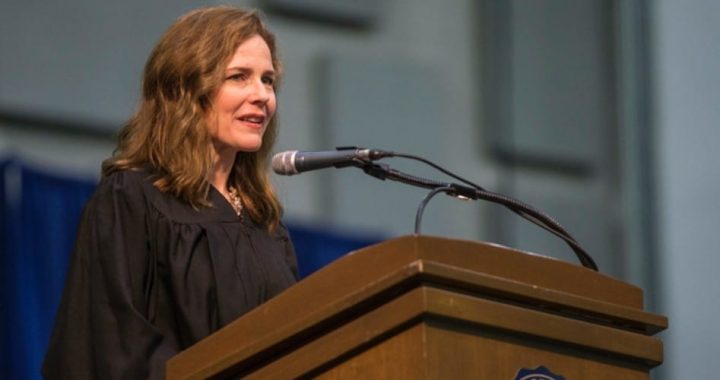
At a North Carolina rally on Friday night, President Trump said, “I will put forward a nominee next week” to fill the seat vacated by the passing of Justice Ruth Bader Ginsburg. He added: “It will be a woman … a very talented, a very brilliant woman. Who I haven’t chosen yet, but we have numerous women on the list.”
On Monday he indicated he will announce his choice on Friday or Saturday.
Amy Coney Barrett was on his short list in 2018 and remains at the top of his expanded list in 2020, according to close associates of the president.
She is a nearly perfect candidate. She made such an impression when she entered Notre Dame Law School in 1994 that, as Politico noted, “a group of professors at the University of Notre Dame first recognized [her] potential … and began paving the way for her career as a conservative jurist: collaborating on scholarship, helping her land a Supreme Court clerkship and later recruiting her to the law school’s faculty.”
She made the best of her opportunities, serving as a clerk to Justice Antonin Scalia, who became her mentor. She adopted his views on the Constitution as an “originalist” and a “textualist,” using the Founders’ original intentions when creating the Constitution (based on their original texts, statutes, and writings at the time) to inform her legal opinions.
After her clerkship, she spent three years in private practice before returning to her alma mater as a constitutional law professor. In 2017, President Trump nominated her to the Seventh Circuit Court of Appeals and, after close (and some say offensive) questioning by some liberal senators about how or whether her strong Catholic faith would impact her decisions, particularly concerning Roe v. Wade, she was confirmed by the Senate.
When the opportunity arose to fill a vacancy on the Supreme Court in 2018 the president passed on Barrett, selecting Brett Kavanaugh instead. He told several people at the time that he was “saving her for Ginsburg.”
And now the time is right.
She is young (48). She is attractive. She is exceedingly bright, serving as executive editor of the Notre Dame Law Review, winning the law school’s highest award — the Hoyne’s Prize — for scholarship and achievement and then graduating first in her class.
She’s a woman, which will allow the liberal Left once again to expose its hypocrisy: It supports women so long as they are liberal. But a conservative woman such as Barrett is anathema, and liberal are already taking the gloves off for the upcoming confirmation fight.
Barrett is faithfully married to her husband, Jesse, and has five biological children and two adopted children. She is a member of St. Joseph Catholic Church in South Bend, Indiana, and belongs to and supports the People of Praise, a small, charismatic Christian parachurch organization that serves the South Bend community.
She is a known quantity and battle-hardened. She survived the grilling during her confirmation hearing for the Seventh Circuit with style and grace.
And she is pro-life. While at Notre Dame, she was a member of University Faculty for Life, a group founded “to promote research, dialogue and publication by faculty who respect the value of human life from conception to natural death.”
She is not hide-bound to honor precedents, either. In 2013, she wrote, “I tend to agree with those who say that a justice’s duty is to the Constitution and that it is thus more legitimate for her to enforce her best understanding of the Constitution rather than a precedent she thinks is clearly in conflict with it.”
She thinks Roe v. Wade was wrongly decided. In 2013, she was paraphrased in Notre Dame’s quarterly alumni magazine as saying that Roe v. Wade has created “through judicial fiat a framework of abortion on demand.”
As The New American noted on Sunday:
The battle lines have already been drawn. At issue will be Roe v. Wade, ObamaCare (the Affordable Care Act), and religious freedom.
Prior to the passing of Ginsburg, the court was divided 4-4 with Chief Justice John Roberts waffling between both camps to protect his legacy while frequently ignoring the Constitution in the process.
A new “originalist” will tip the balance of the court in favor of the original intent of the Founders, neutralizing Roberts’ influence, and finally giving “textualists” a majority.
There is incentive to confirm her appointment quickly. If the threat by the Deep State to upend the election in November through mail-in balloting fraud becomes real, the legal challenge could find its way to the high court, as it did in 2000 in Bush v. Gore. Barrett’s timely arrival, in that event, would help the court declare Trump to be the winner.
Photo: AP Images
An Ivy League graduate and former investment advisor, Bob is a regular contributor to The New American, writing primarily on economics and politics. He can be reached at [email protected].
Related article:
Trump to Name Woman to Replace Justice Ginsburg; Expect Contentious Confirmation Hearing



